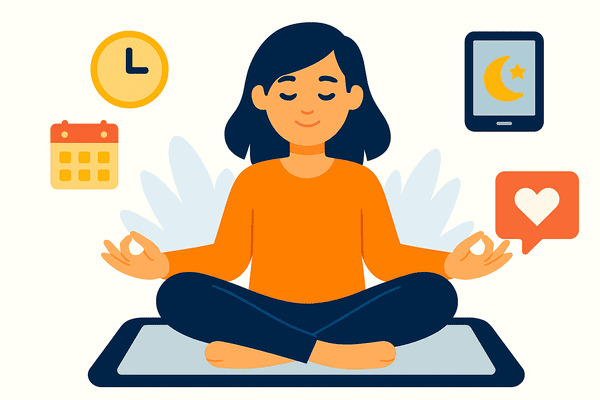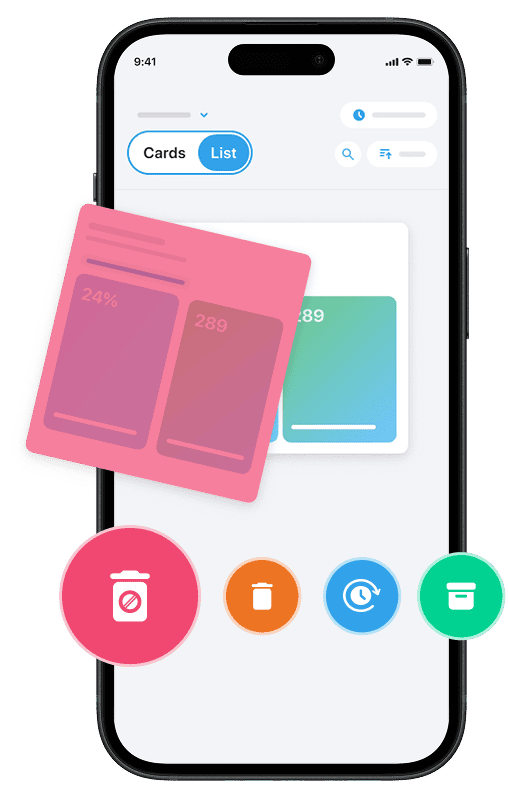In today’s world, digital media and technology play a significant role in shaping our daily lives. They offer incredible benefits, such as keeping us connected and providing valuable resources, but they also come with unique challenges. If not used mindfully, these tools can impact our mental health, disrupt our sleep quality, and hinder our ability to focus. That’s why finding the right digital life balance is so important for building healthier online habits. One approach to balance is practicing Digital Nutrition , which helps you manage screen time and content intake more intentionally.
To navigate this digital landscape effectively, developing healthy digital habits is essential. These habits help protect your mental and physical health, promote behavioral balance, and allow you to enjoy the benefits of digital life without becoming overwhelmed by excessive screen time. By paying closer attention to your social media habits and establishing intentional routines—such as creating tech-free zones or implementing a family media plan—you can cultivate healthy digital practices that enhance your overall wellbeing.
This article will provide you with actionable strategies to optimize your digital use, empowering you to improve your focus, enhance your sleep, and boost your mental health.
Another powerful way to support healthier digital habits is by taking control of your inbox. Clearing out unwanted spam not only declutters your digital space but also reduces distractions and stress. With Cleanfox, you can easily clean up your inbox—completely free—making it simpler to stay focused and organized.
Optimizing Digital Tools for Focus
Set Specific Times for Email and Social Media
To protect your focus from constant interruptions, it’s important to set clear boundaries around when you check email and social media. Instead of scrolling through feeds or responding to messages at random moments, designate specific times during your day for these activities. This helps reduce the habit of continuously switching tasks, which fragments your attention and reduces productivity.
By controlling your social media habits and limiting time on social media to scheduled intervals, you can maintain deeper concentration during work or study sessions.
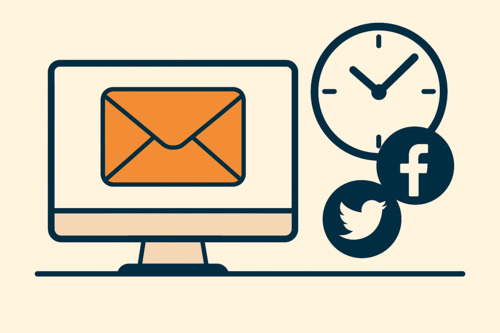
Use Focus Apps to improve your Digital Healthy Habits
Leverage technology itself to improve your focus by using dedicated apps designed to minimize distractions. Apps like Forest gamify the process by growing virtual trees while you stay off your phone, rewarding you for maintaining attention. Other tools such as Freedom or Cold Turkey can block distracting websites and apps during chosen focus periods, creating a digital environment free from temptations.
RescueTime provides valuable insights into how much time you spend online, helping you recognize and adjust unproductive media habits and screen time.
Say goodbye to spam, clutter, and chaos.
Our smart email cleaner filters out junk, organizes your inbox, and helps you focus on what really matters.
✅ Block spam automatically
✅ Organize emails by priority
✅ Keep your inbox clean
✅ Clean old emails you don’t read
📱 Available on the App Store and Google Play.
Organize Digital Workspaces
Just as a cluttered physical space can disrupt your workflow, an unorganized digital workspace can impair your ability to focus. Use tools and strategies that keep your desktop, browser tabs, and files neatly arranged.
Virtual environments like LifeAt.io offer distraction-free spaces specifically designed to enhance concentration. Employ digital to-do lists, calendar reminders, and task managers to structure your day and create a clear playbook for your work.
Organizing your digital workspace reduces mental overload and helps you stay engaged with your tasks longer.
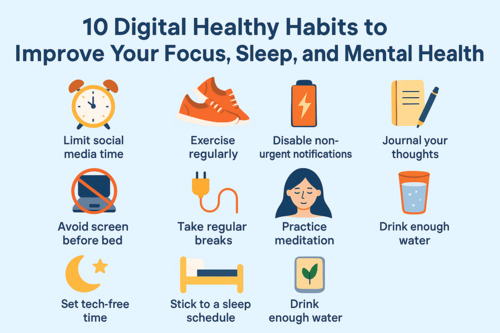
Enhancing Sleep with Technology
Adopt a ‘No Screens’ Policy Before Bed
One of the most effective ways to enhance your sleep quality is to establish a tech-free period before bedtime. Exposure to blue light emitted by screens on phones, tablets, and computers can interfere with your body’s natural production of melatonin, the hormone that regulates sleep. By adopting a ‘no screens’ policy at least 30 to 60 minutes before going to sleep, you help your brain wind down and prepare for restful sleep.
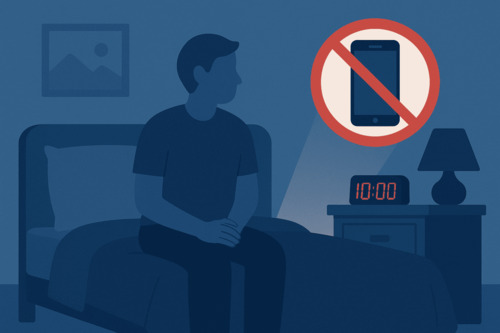
Creating tech-free zones or setting screen time limits in the evening contributes to healthier, more restorative sleep patterns.
Use Sleep-Tracking Apps
Sleep-tracking technology has advanced to become a valuable tool for understanding your individual sleep habits. Modern apps and wearable devices monitor parameters such as total sleep time, sleep phases, and restlessness, providing insights that can help you improve your nightly routine. Studies show that consumer-grade sleep trackers can be quite accurate for healthy individuals, giving you useful feedback to make informed changes.
By monitoring your sleep, you can identify patterns related to lifestyle or environmental factors and better tailor your habits to support both your physical health and mental well-being.
Opt for Comforting Sounds and Alarms
Technology can also assist in creating a soothing sleep environment through calming sounds or gentle alarms. Apps offering white noise, nature sounds, or guided meditations can help ease anxiety and support relaxation as you prepare to sleep.
Likewise, using alarms that wake you gradually with soft sounds can prevent sudden interruptions that disrupt your rest. These features promote a seamless transition between wakefulness and sleep, enhancing overall sleep quality and supporting your health through improved restfulness.
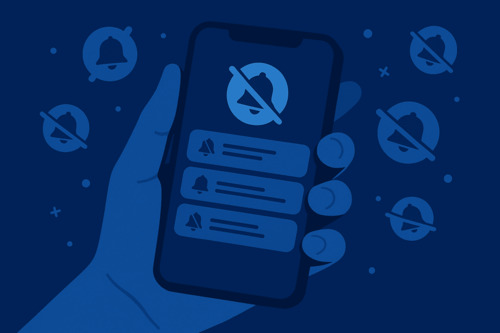
Maintaining Digital Healthy Habits Through Digital Means
Practice Mindfulness and Meditation Apps
Mindfulness and meditation apps provide powerful digital tools to support your mental health by helping reduce stress, anxiety, and symptoms of depression. Apps like Headspace and Calm are backed by research demonstrating their ability to improve mood, enhance focus, and promote emotional resilience through consistent use. By engaging with guided mindfulness exercises on these platforms, you can cultivate healthier responses to stress and boost your overall mental wellbeing.
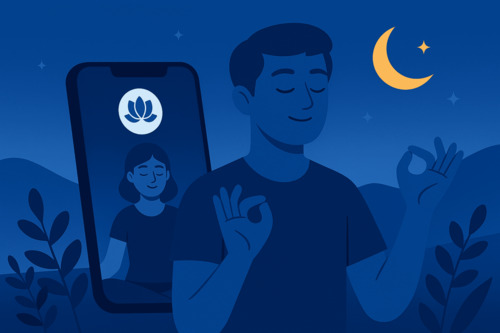
These resources make it easier than ever to integrate mindfulness practices into your daily routine, even if you have a busy schedule.
Limit Notifications
Constant notifications from apps and social media can disrupt your attention and contribute to increased anxiety, ultimately undermining your mental health. By limiting or customizing notifications, you can minimize intrusive interruptions and reduce the pressure to respond immediately. This simple yet effective change fosters a healthier relationship with technology, enabling you to focus on what truly matters while alleviating feelings of overwhelm caused by excessive screen time and digital distractions.
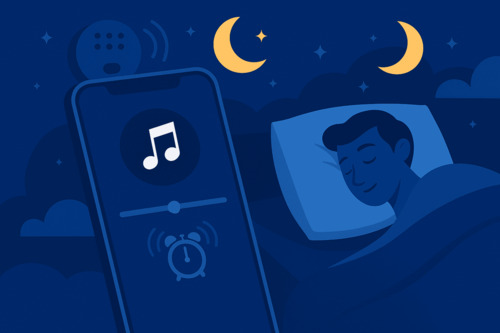
Engage in Digital Social Interactions Wisely
Online social support is an important factor in maintaining mental wellbeing, but it’s important to engage thoughtfully with digital interactions. Focus on building meaningful connections rather than succumbing to passive scrolling or spending excessive time on social media platforms.
Seek balanced interactions that provide genuine support and avoid falling into comparison traps, which can harm your mental health. Using social media deliberately and purposefully, rather than as a default activity, helps conserve your emotional energy and encourages a healthier digital lifestyle.
Conclusion 💡
Developing and maintaining healthy digital habits is vital for improving your focus, sleep, and mental health in a technology-driven world. By setting specific times for email and social media, using focus apps, and organizing digital workspaces, you can optimize attention and productivity.
Enhancing sleep through a no-screens policy before bed, sleep-tracking apps, and soothing sounds supports both physical and mental wellbeing.
Additionally, practicing mindfulness, limiting notifications, and engaging in meaningful digital social interactions help protect your mental health. Take charge today by implementing these strategies to cultivate a balanced, healthy digital lifestyle that promotes overall health and wellbeing.
FAQ 🔍
What is a healthy digital habit?
A healthy digital habit involves limiting screen time, prioritizing active over passive usage, engaging in offline hobbies, and maintaining routine technology use. It also includes being responsible with personal data, using tools like app timers to manage use, and regularly updating passwords for security.
What are the digital habits?
Digital habits are routine behaviors related to how we use digital devices and platforms, including smartphones, computers, and apps. They include good habits like updating passwords, digital decluttering, and productive app use, as well as bad habits such as constant social media checking, binge-watching, mindless scrolling, and oversharing. These habits shape productivity, well-being, and how we interact online and offline.
What are 10 healthy habits?
Ten healthy habits include prioritizing quality sleep, staying hydrated, eating a balanced diet rich in plants, regular exercise, practicing good sleep hygiene, safe sun protection, self-massaging, practicing yoga or mind-body exercises, managing mental health, and maintaining routine medical exams. Adding daily steps and morning stretching also helps.
What is a healthy digital diet?
A healthy digital diet means consciously managing your use of digital devices and content to support mental and emotional well-being. It involves setting boundaries on screen time, selecting positive and meaningful content, balancing online and offline life, and taking breaks to avoid digital burnout, just like moderating food intake for physical health.
Loved this article? Keep exploring Healthy Digital Habits with our guide: “How to Reduce Screen Time: 10 Easy Habits That Actually Work.”
And be sure to check out the rest of our blog for more practical tips!


